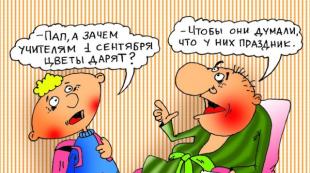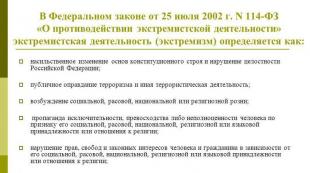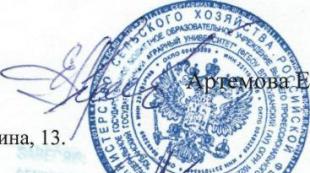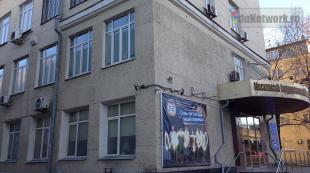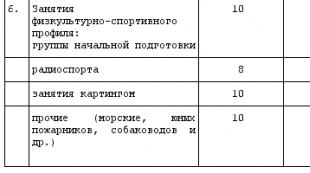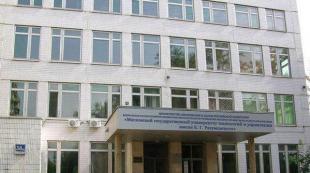On the question of the type of civilization of Russia. Civilizational search of Russian society to what type of Russian civilization
To what type of Russia? Some believe that according to the geographical location of their historic center, the influence of Christianity, historical roots in the Greek-Byzantine and Western European culture, Russia belongs to the Western type of civilizations. Others - that historically, the influence of Eastern cultures (Tatar conquest, the influence of the Eastern neighbors, huge expanses of Siberia, had a decisive effect on the nature of Russian society), so Russia can rather be attributed to Eastern civilizations. Third believe that Russia cannot be attributed to either Western or Eastern civilizations, that it forms a special, Eurasian type either "drifting" between the West and Bact. Last point of ZPEni clearly expressed L.I. Semennikova: "1. Russia is not independent civilization and does not apply to any of the types of civilizations in pure form.2. Russia is a civilizational inhomogeneous society. This is a special, historically established conglomerate of peoples relating to different types of development, united by a powerful, centralized state with Velikorvsky Nadrom.3. Russia is geopolitically located between two powerful civisal influence centers - East and West, includes peoples, developing both in the Western and Eastern version of ... 4. With steep turns, historical vortices "shifted" the country is closer to the west, closer to the east. Russia is as it were, a "drifting society" at the crossroads of civilizational magnetic fields. " BUT!!! individually-distinctive (as a local civilization) and generic (as the civilization of the Western type) signs of Russia are quite clearly defined.
SECTION 1
Civilization search for Russian society
Topic 1. Theoretical and methodological foundations of a civilization approach to history.
1. What does science "History" study? What is her subject?
Sources:
- History of Russia IX-XX BB: Textbook \\ Ed. G.A. Amon, N.P. Ionicheva.-M.: Infra-M, 2002. C 3-4
History, translated from Greek literal story, a story about what was recognized, studied.
History - Science, exploring the past of the human society in all spatial concreteness and diversity in order to understand the present and trends in the development of the future.
The object of study is the past of humanity.
Between really existing reality, i.e. The past, and the result of the study of the scientist - a scientifically recreated picture of the world - stands an intermediate link. It is called a historical source. This is the subject of study.
It is customary to allocate 7 major groups of historical sources: written, real, ethnographic, oral, linguistic, photo film documents, phonocuments.
2. Name the main types of civilizations. Which one is Russia?
Sources:
- History of Russia IXX-XX century: Textbook \\ Ed. G.A. Amon, N.P. Ionicheva - M.: Infra-M, 2002. From 6-13
Civilization is a community of people who have similar mentality, common fundamental values \u200b\u200band ideals, as well as sustainable features in a socio-political organization, economics, culture.
There are three types of civilizations: unpressive, cyclic and progressive.
TO Nepnostrusive Development Typethe peoples living in accordance with nature (Australia's aborigines, some African tribes, America Indians, the small peoples of Siberia and the North of Europe). The goal and the meaning of the existence of these peoples are seen in the preservation of customs, techniques there, traditions that do not violate unity with nature.
Cyclic type of development There was an antiquity in the countries of the East (India, China, etc.), society and the person in it exists within the framework of historical time, which is divided into past, present and future. For these peoples, the golden age in the past, it is poeticized and serves as a role model.
Cyclical (Eastern) type of civilization is still widespread in Asia, Africa, America. The standard of living of the people with this type of development is extremely low. Therefore, in the twentieth century, projects of acceleration and development of society and improving human life appeared.
Progressive Type of Development of Civilization (Western civilization)main features:
- Class structure of society with developed forms of trade unions, parties, programs, ideologies;
- Private property, market, as a way of regulating operation, high prestige of entrepreneurship;
- Independent horizontal relations between individuals and society cells: economic social, cultural, spiritual;
- Legal democratic state regulating socially class relations for permission social conflicts, ensuring civil peace and implementation of progress ideas.
From the position of ethnogenesis and civilization approach, Russia does not apply to any of the three types of civilizations in its pure form. Russia is a special civilization of the historically established conglomerate of peoples relating to different types of development, combined by a powerful centralized state, based on the Great Russian, Orthodox nucleus.
Russia is located between two powerful civic civisional centers and the East and West, and includes peoples developing and east, and in the Western version.
Topic 2. Education and main stages of the development of ancient Russian state. Civilization of ancient Russia.
1. Name the main stages of the development of ancient Russian state.
Sources:
- History of Russia IX-XX BB: Textbook \\ Ed. G.A. Amon, N.P. Ionicheva - M.: Infra-M, 2002. Since 38-58.
- Patriotic history until 1917: Tutorial \\ Ed. Prof. AND I. Froyanov. - M.: Gardariki, 2002. Since 19-87.
Stage 1. (IX - mid-X centuries) - the time of the first Kiev princes.
862 - Mentioning in the chronicle of the calling of the Varangian Prince Rurik at the reign in Novgorod. 882. The association of Novgorod and Kiev under the rule of Prince Oleg (879-912). 907, 911 - hiking of Prince Oleg on Constantinople. Signing the agreement of Russia with the Greeks. 912-945 igno princess. 945 - the uprising in the land of Drevlyan. 945-972 - Prince Svyatoslav Igorevich. 967-971 - War of Prince Svyatoslav with Byzantia.
We described the main types of civilization, formed in the ancient world, antiquity and the Middle Ages. In the era of the Middle Ages begins the entry into the world historical process at first Rus, and then Russia. The question is naturally facing: what type of civilization can it be attributed? The solution of this issue is of great importance for the methodology for studying the history of Russia. But this is not just a historical and scientific, but socio-political and spiritual and moral problem. This or how a solution to this problem is related to the choice of the path of development of our country, the definition of the main value guidelines. Therefore, the discussion on this issue did not stop throughout russian history. In our opinion, there is no need to reproduce the entire course of this discussion. When presenting the appropriate topics we will touch this issue. Now it is necessary to fix the basic principal positions.
The main question of this discussion is how to relate in the history of Russia the legacy of Eastern and Western civilizations? To what extent is the citizens of Russia? Historians, publicists and public figures give an answer to these questions from the height of their time, taking into account the entire preceding historical development of Russia, as well as in accordance with their ideological and political installations. In historiography and journalism of the XIX-XX centuries. The polar solution of these issues was reflected in the position of Westerners and Slavophiles.
Westerners or "Europeanists" (V. G. Belinsky, T. N. Granovsky, A. I. Herzen, N. G. Chernyshevsky, etc.) proposed to consider Russia as an integral part of Europe and, therefore, as an integral part of Western element Civilization. They believe that Russia, although with some lag, developed in line with Western civilization.
In favor of this point of view, many characteristics of Russian history speak. The absolute majority of the population of Russia professes Christianity and, therefore, committed to the values \u200b\u200band socio-psychological plants, which underlie Western civilization. Reformed activities of many statesmen: Prince Vladimir, Peter I, Catherine II, Alexander II aimed at the inclusion of Russia to Western civilization.
There is a different extreme position, the adherents of which are trying to attribute Russia to countries with the eastern type of civilization.
Supporters of this position believe that the few attempts to recruit Russia to Western civilization have fallen unsuccessfully and did not leave a deep track in the self-consciousness of the Russian people and its history. Russia has always been a kind of eastern despot. One of the most important arguments in favor of such a position is the cyclicality of the history of Russia: for the period of reforms, the period of counterposses inevitably followed, for the reformation - counterperification. Supporters of this position also indicate the collectivist nature of the mentality of the Russian people, the absence of democratic traditions in the Russian history, respect for freedom, the dignity of the individual, the vertical nature of social and political relations, their mainly subject to color and so on.
But the largest course in the historical and social thought of Russia is the ideological and theoretical course that defends the idea of \u200b\u200bthe identity of Russia. Supporters of this idea are Slavophiles, Eurasians and many other representatives of the so-called "patriotic" ideology. Slavophiles (A.S. Khomyakov, K.S. Aksakov, F.F. Samarin, I.I. Kireevsky and their followers) The idea of \u200b\u200bthe identity of Russian history was associated with solely peculiar way of the development of Russia, And, therefore, with an exceptional peculiarity of Russian culture. The initial thesis of Slavophilov's teachings is to approve the decisive role of Orthodoxy for the formation and development of Russian civilization. According to A. S. Khomyakov, it was Orthodoxy formed "that iseply Russian quality, that" Russian Spirit ", which created Russian land in its infinite volume."
The fundamental idea of \u200b\u200bRussian Orthodoxy, and, therefore, and the whole building of Russian life is the idea cattle. Cathedral is manifested in all spheres of vital activity of a Russian man: in the church, in the family, in society, in relations between states. According to Slavophiles, the Cat is the most important quality that Russian society separates from all over Western civilization. Western peoples, departing from the decisions of the first seven universal cathedrals, was distinguished by the Christian symbol of faith and thereby betrayed the conjunction of the Cathedral beginning. And it gave rise to all flaws of European culture and primarily its mercantilism and individualism.
Russian civilization are inherent high spirituality based on ascetic worldview, and collectivist, community-based social life. From the point of view of Slavophiles, it was Orthodoxy who spawned a specific, social organization - a rural community, the "world", which has economic and moral importance.
In the description of the agricultural community, Slavophilas is clearly visible the moment of its idealization, embellishment. The economic activities of the community seems to be a harmonious combination of personal and public interests, and all members of the community speak relative to each other as "comrades and shareholders". At the same time, they still recognized that in the modern community device there are negative moments generated by the presence of serfdom. Slavophiles condemned the serfdom and advocated his abolition.
However, the main advantage of the rural community Slavophila was seen in those spiritual and moral principles that she brings up from their members: readiness to stand up for common interests, honesty, patriotism, etc. In their opinion, the emergence of these qualities in the community members does not consciously occur, but Instinctively, by following the ancient religious customs and traditions.
Based on the principal installation that the community is the best form of social organization of life, Slavophiles demanded to make the community principle of comprehensive, that is, to transfer it to the scope of urban life, in industry. The community-based device should also be based on public life and is capable, according to them, replace "abominating administrativeism in Russia".
Slavophiles believed that as the "Community Principle" disseminate in Russian society will continue to strengthen the "spirit of the Council". The leading principle of social relations will be the self-denial of each in favor of all. " Due to this, the religious and social aspirations of people are solved into a single stream. As a result, the task of our inner history, determined by them as "enlightenment of the people's community-started start by the beginning of communal, church".
Slavophilism is based on the ideology of pancakers. The basis of their idea of \u200b\u200bthe special fate of Russia is the idea of \u200b\u200bexclusiveness, the features of the Slavs. Another essential destination defending the idea of \u200b\u200bthe identity of Russia is eurasianism (P.A. Karsavin, I.S. Trubetskaya, G.V. Florovsky, etc.). Eurasians, unlike Slavophiles, insisted on the exclusiveness of Russia and the Russian ethnic. This exclusivity, in their opinion, was determined by the synthetic nature of the Russian ethnic volume. Russia is a special type of civilization, which differs from both the West and the East. This special type of civilization they called the Eurasian.
In the Eurasian concept of the civilization process, a special place was given to the geographical factor (natural environment) - "location" of the people. This environment, in their opinion, determines the features of various countries and peoples, their self-consciousness and fate. Russia occupies the median space of Asia and Europe, approximately outlined by three great plains: Eastern European, West Siberian and Turkestan. These huge plain spaces, devoid of natural sharp geographic frontiers, imposed a mark on the history of Russia, contributed to the creation of a peculiar cultural world.
A significant role in the arguments of the Eurasians was allocated to the peculiarities of the ethnogenesis of the Russian nation. The Russian ethnos was formed not only on the basis of the Slavic ethnos, but under the strong influence of the Turkic and threshold tribes. The impact on the Russian history and the Russian self-consciousness of the Eastern "Turansky", mostly Turkic-Tatar element associated with the Tatar-Mongolian IGOM was emphasized.
The methodological attitudes of the Eurasians largely shared the prominent Russian thinker N.A. Berdyaev.
One of the most important characteristics of Russian people's individuality, according to Berdyaev, is its deep polarity and inconsistency. "The inconsistency and complexity of the Russian soul, he notes, may be due to the fact that two flux of world history come into cooperation in Russia: East and West. The Russian people are not purely European and not a purely Asian people. Russia is a whole part of the world, a huge east-west, it connects two worlds. And always in the Russian soul there were two beginnings, east and western "(Berdyaev N.A. Russian idea. The main problems of the Russian thought of the XIX and the beginning of the 20th century. In the Sat." About Russia and Russian Philosophical Culture. Philosophers of the Russian post-Belyabe abroad. "- M., 1990. - P. 44).
ON THE. Berdyaev believes that there is a correspondence between the immensity, the infinity of the Russian Earth and the Russian soul. In the soul of the Russian people there is the same immense, infiniteness, aspiration in infinity, as in the Russian plain. The Russian people, approves Berdyaev, was not the people of culture based on an ordered rational basis. He was the people of revelations and inspirations. The two opposite principles were formed in the foundation of the Russian Soul: the pagan donomistic element and ascetic monastic Orthodoxy. This duality permeates all the main characteristics of the Russian people: despotism, state hypertrophy and anarchism, liberty, cruelty, tendency to violence and kindness, humanity, softness, terrain and selection of truth, individualism, aggravated personality consciousness and impersonal collectivism, nationalism, self-power and universalism, Ensure, eschatology-messenger religiosity and external piety, the search for God and militant worry, humility and arrogance, slavery and riot. These contradictory features of the Russian national nature predetermined, according to Berdyaev, the complexity and cataclysms of Russian history.
It should be noted that each of the concepts that determine Russia in world civilization is based on certain historical facts. At the same time, in these concepts, the one-sided ideological orientation is clearly shifting. We would not want to take the same one-sided ideologized position. We will try to give an objective analysis of the stroke of the historical development of history in the context of the development of world civilization.
Stavropol 2007.
BBK 63.3 (2) y73
Russia in World Civilization (IX-XIX V.V.)Tutorial for independent work Students. -Tallool. Ed: SGMA, 2007. ISBN
Compiler: L.I.TSapko
The study manual for independent work of students is considering the main milestones of Russian history from the IX to the XIX century. The history of Russia is considered in the context of world civilization. The training material is subject to heads in chronological order. The use of unite-graphic elements allows you to better understand and assimilate the material, approach the comprehension of a complex and controversial historical process.
The textbook is intended for students of medical and pharmaceutical universities.
Reviewers:
Boylina T.A.,d.I., Professor, Head. cafe. Stories of Russia SSU
Kalinchenko S.B.., K.I.N., Associate Professor of the Department of History SGAU
© Stavropol State Committee
medical Academy, 2007
Preface
An attempt was made to the manual in accordance with the requirements of the current Gosstandart Russian Federation For higher educational institutions from new positions and in a holistic form, analyze the domestic history, show history as a process, identify the logic of the development of Russia's history. Some highlights and trends of domestic history are given on the background of foreign, since both a person can not know itself out of communication with other people and the history of one country, even such a specific, as Russia, cannot be understood and comprehended without comparing its principal moments with the history of others. countries. The history of Russia simply does not exist outside of European and world history. And not only in the sense of chronological or geographical. Russian specifics and even "uniqueness" - there is a peculiar manifestation of global processes. Understanding russian history - prerequisite For awareness of what is happening in the world. The textbook aims to help the student in the formation of specific ideas about the most important eventswho determined the course of world history and the socio-historical structures underlying it. When writing the benefit, two approaches were used - problem and chronological, allowing to analyze the most important parties to the life of the state and society for a long time. Limit volume tutorial And his focus on the contingent, already familiar from school education with some historical facts, was forced to abandon the detailed presentation of all the facts to focus on the critical key points of Russian history. Conference of history The process is creative and diverse, so it is impossible without thoughtful and intense independent work. Visual schemes, charts, tables presented in the manual should help students.
Topic 1. Methodological problems and basic concepts of historical science. The place and role of Russia in history.
Plan
1. The subject, methods and sources of study of the history of the Fatherland.
2. Russian historical science. Features of Russian history.
3. Conditions for the formation of Russian statehood: factors determined by the features of Russian civilization.
History is a collective memory of the people. Loss of historical memory destroys public consciousness, makes life meaningless. As the great Pushkin wrote, "respect for the last one is a trait that distinguishes the formation of wildness."
The term history of Ionian origin. Ionia has become the birthplace of early Greek prose, on which he wrote his essay Herodotus - "Father of History" VV. BC. However, a clear distinction between science and art at that time has not yet been conducted. It is clearly reflected in the mythology of the ancient Greeks: the goddess of Athena patronized and the arts and sciences, and Muse Klio was considered a patronage of history. The compositions of the ancient authors included information both in history and in literature, geography, astronomy, theology.
Historical science is trying to give a holistic vision of the historical process in the unity of all its characteristics.. It does not differ in this from other sciences. As in other sciences, there are accumulation and opening of new facts in history, the theory is improved, taking into account the development of other branches of knowledge (cultivation, historical
psychology, sociology, etc.), methods of processing and analyzing sources (for example, application mathematical methods). The most frequently in historical science uses two groups of methods: general scientific and special historical.
General scientific methods - these are methods of empirical research (observation, measurement, experiment); The methods of theoretical research (idealization, formalization, modeling, induction, deduction, a mental experiment, a systematic approach, historical, logical, etc.) general scientific methods are necessary on the theoretical level of historical science. In relation to specific historical situations, they are used to develop special historical methods for which they serve as a logical basis.
Special historical methods There are various combination of general scientific methods adapted to the features of the studied historical objects. These include: historical genetic; Historical and comparative; historical and typological; historical system; method
diachronic analysis.
History is a science that studies past in the entire totality of concrete facts, seeking to reveal the causes and consequences of events that happened, to understand and evaluate the course of the historical process.
. It is impossible to create a new world, bypassing the past, - people knew
at all times.
All this
testifies in favor of the fact that knowledge of history allows you to clearer
understand modernity.
The task of history is a generalization and processing of accumulated human experience. The subject of history is the study of human society as a contradictory and unified process.
It has long been noticed that the stones say if these are stones of history. -
The proof of conclusions is a mandatory trait of scientific knowledge. Isto
Riya operates precisely established facts. As in others
Sciences, in history there is a savings and opening of new facts.
These facts are extracted from historical sources. Historical sources - These are all the remnants of past life, all evidence of pro
Shoe. Currently allocated four main groups
Historical sources: 1) real;
2) written; 3) I.
zobly; 4) Fonic.
Historians explore all the facts without exception. The assembled actual material requires its explanation, clarifying the reasons for the development of society. So theoretical concepts are produced. Thus, on the one hand, knowledge is necessary -
specific facts, on the other - the historian must comprehend the whole owl
Fact consumption in order to identify causes and patterns
The development of society.
At various times, historians explained differently the causes and patterns of development of the history of our country. Chronicles since the times
Nestor It was believed that the world develops according to Divine Providence and Divine Will. With the advent of experienced, rationalistic knowledge
historians as the defining power of the historical process -
began to look for objective factors. So, M. V. Lomonosov (1711 -
1765) and V.N. Tatishchev (1686 - 1750), who stood at the origins of historical science, believed that knowledge, enlightenment determine the course of the historical process. The main thought, permeating works
N. M. Karamzin (1766 - 1826), ("The history of the state of the Russian
»),
- The need for Russia's wise autocracy.
The largest Russian historian Xih in. S. M. Solovyov (1820-1870
) ("History of Russia from ancient times") I saw the course of history
countries in the transition from generic relations to the family and further to
statehood. Three most important factor: country nature, nature -
The tribes and the course of external events, as historian believed, objectively determined the course of Russian history.
Student S. M. Solovyova V. O. Klyuchevsky (1841 - 1911) ("Curred Russian History"), Developing the ideas of his teacher, believed that it was necessary to identify the entire totality of facts and factors (geographical, -
ethnic, economic, social, political, etc.),
characteristic for each period. "Human nature, human general
and nature of the country - these are the three main forces that build
Yat human hostel. "
Russian specifics and even its "uniqueness" - there is only a kind of manifestation of global processes. Often the manifestation is extreme. But that is why the understanding of Russian history is a necessary condition for the awareness of what is happening in the world. And, on the contrary: without an understanding of world history, the Russian past is really turning into a chain of ridiculous mysteries, which, as the poet said, not to understand, not to measure neither the general arches. Disciple of an outstanding liberal historian Kuevevsky Mikhail Pokrovsky It came to the conclusion that the Russian past needed radical rethinking, and Marxist analysis gives the key to a new understanding of events. K. Marks in Ser.Xix. Formulated the concept of materialistic explanation of the story, which was based on a formational approach. He proceeded from the following installation: if humanity is progressively developing as a whole, then all of it must pass in its development of certain stages. These stages, the thinker called "socio-economic formations". According to the social and economic formation, it is a method of production, which is characterized by a certain level of development of productive forces and the relevant level and nature of production relations. The combination of production relations forms its basis on which political, legal and other relations are configured, which in turn correspond to certain forms of public consciousness: morality, religion, art, philosophy, science, etc. The transition from one socio-economic formation to another is carried out on the basis of social revolution. In this regard, the class struggle was declared the most important driving power stories. However, a person appears in this theory only as a breeding of a powerful objective mechanism.
In the 30s of the 20th century, a new direction of historical thought was originated in France, the name of the school "Annals." The followers of this direction often use the concept of civilization. Civilization - a set or a certain level of achievements of material and spiritual culture, techniques and ways of contacting a person with nature, lifestyle, established stereotypes of thinking and behavior. Scientists believe that the story is designed to study a person in the unity of all its social manifestations. Public relations and labor activities, forms of consciousness and collective feelings, morals and folklore - a person appears in these persons in the works of this direction. The weakness of the methodology of the civilization approach consists in amorphous criteria for the allocation of types of civilizations. Intellectual and spiritual and moral structures of a person undoubtedly play a crucial role in history, but their indicators are badly catching, vague. With all the diversity of civilizations in the history of mankind, two macrobility - East and West can be distinguished.
In domestic and world historiography
Three main points of view on the problem of features
(specifics) of Russian history. Supporters first, holding concepts
Odnolynosis of world history, believe that all countries
us I.
peoples, including Russia and the Russian nation,
go in their evolution alone and the same common to all
Stages moving one by one, common to all paths.
Those or other features of Russian history are interpreted
representatives of this school as a manifestation
Russian and Russians. In the most
This form is presented in the works of you
giving Russian historian Sergey Mikhailovich
Catchie
Supporters of the second approach to Russian history
Go from the concept multicorerity historical times
Vitia.. They believe that the history of mankind consists
Of the stories of a number of original civilizations,
Giving of which is preferably developing (developed)
any one (or specific combination of several
kih) side of human nature, evolving on
his own path; One of these civilizations includes Russian (Slavic) civilization. Of
domestic researchers this approach is
more comprehensive form is justified late Slavophy
Scrap Nikolai Yakovlevich Danilevsky.
The third group of authors is trying to reconcile both hikes. Representatives of this direction belonged to a prominent Russian historian and a public figure
Pavel Nikolaevich Milyukov. In his opinion, in the
Three main groups differ in the result
providing its conditions: "The first condition is the internal tendency
The internal law of development, inherent in society and for any society is the same. Second
SLO
provisions in the peculiarities of that material
Environments, settings, among which this society is destined to develop.
Finally, the third condition is influenced
Research Institute of a Single Human Personality
Process. "
So, representatives of the three approaches by different tract
Tow the problem of the features of Russian history. Nevertheless
Less all of them recognize the impact on its course of some
powerful factors (causes, conditions) under the influence of
the history of Russia is significantly different from
Rii Western societies.
What kind of conditions is it? In domestic and foreign historiography, 4 factors are usually allocated - identifying features (rubbing
Difference, originality, originality) Russian
stories: climatic natural; geopolitical; religious; social organization.
Influence natural climatic factor All researchers celebrated, one of the latter stopped on this issue L.V.Milovusing a solid actual basis. Russia lies in the area of \u200b\u200bthe arctic anticyclone, which makes fluctuations in the temperature significantly up to 35-40 degrees per year. In Europe, the peasant has no "dead season", which tears it to systematic work. In Russia, the deep drainage of soil and short spring, turning into a hot summer, forcing the peasant after home worries of winter pores quickly switch to S / x work - Pakhtot, North, from the speed of which its welfare depends on the course of the whole year. Summer for the Russian peasant is a period of suffering, utter voltage. It produces in the Russian person the ability to "postpone, carry out a huge work in a short time. But the time of the suffer is small. Winter in Russia continues from 4 to 7 months. Therefore, the main form of attitude to work is the ratio of a leisurely passive.
However, this attitude towards labor and life is connected with another value of the Russian man - his patience, which became one of the features of a national character. Better "Thread" than to take something, change the course of life. This behavior is justified by the nature of the labor and resettlement of Russian peasants. The development of forests that covered most of the territory of the country, cutting down and the village of the forest, the plowing of the Earth demanded the collective labor of several families. Working in the team, people acted uniformly, trying not to stand out among others. The cohesion of the team was more important than the effectiveness of the activities of each of the people who made it. As a result, among the Russians, individualism developed, forcing the initiative, improving labor efficiency and personal enrichment. The support of the team guaranteed the peasant the definite share of irresponsibility in the commission of certain actions, the ability to do "on Avos" without thinking. A serfdom or dependent peasant in Europe fled to the city, which was an island of democracy and the right among the sea of \u200b\u200bfeudal peculiarity. There was nowhere else to run, except for the sea. In Russia, they were fled not to the city, but in the Cossacks, from where "issuing was not", in the splitters - on the outskirts, for undeveloped land. As a result, urban, bourgeois values \u200b\u200bwere developed in Europe, and in Russia - communal, collectivist. European solved his problems, developing clearance and self-adequation, and Russian - claiming equalized collectivist ideals. At the political level, this was manifested accordingly in bourgeois revolutions, as a result of which the state as the institute fell into dependence on civil society and approved the values \u200b\u200bof liberalism and democracy or in peasant wars, during which the Cossacks and peasants tried to embody their equalizing ideals in the life of the state. The result of such attempts was only the strengthening of the authoritarian, undivided government of the state.
Colonization undermined demographic conditions Historical development. If in Europe, the population density growth has stimulated the processes of creating cities, class formation, the intensification of the economy, then in Russia each of the colonization steps has been associated with a large or smaller population density in the center of the country. This was the consequence of the fact that Russian colonization was carried out not only due to the growth in population, but also by resettlement, the flight of people from nomads, social oppression and hunger. Colonization of land in the IX-XVII centuries. More and more rejected Russia from Europe, prevented the assimilation of advanced achievements of European civilization. In the IX-XII centuries. The ancient Russian state was created on the great European trading path "from Varyag to Greeks", which bind to North and South Europe. Two centers of ancient Rus: Novgorod and Kiev stood on the nodal points of this path. However, already in the XIII century. The trading path of "Varyag in the Greeks" began to give way to the "Amber Way", a member of Central Europe. It was associated with the transition of the role of the leading global power of the Mediterranean from Byzantium to the Venetian Republic. As a result, Rus lost in its political weight, became the periphery of Europe . In the process of colonization of Eastern land, Russia has become part of the Eurasian geopolitical space, in which the authoritarian forms of power dominated an overradulted.
The paradox of the historical development of Russia was that the damage to him was applied not only to the fall in the natural productivity of natural forces as it was leaving from the Black East South-West into the Sugiline Lands of the North-East in the XIII century. (In this case, the yield fell 1.5- 2 times). "Asiance", stagnation in the development of the industry led to the fact that the discovery and development of new natural wealth contributed to the obstacle. Focusing in the 1st half of the XIX century fortress heavy industry in the Urals, rich natural resourcesHe led to a sharp lag of Russia from the West in this industry, important for industrialization and defense of the country. It was the wealth of resources forced to consider unimportant to introduce free labor and new technological processes in metallurgy and metallowing. The development of the Black Earth of the Black Sea region and the Volga region led not only to the rise of the yield, but also the development of serfdom in the XVIII century., Those who had a social development. The unprecedented wealth of Siberia before the beginning of the 20th century was actually unused. The trouble of Russia was not in the lack of natural wealth, but in the socio-political strict and cultural tradition, penetrated by community and Asian influences that did not allow these wealth to use.
Extremely complicated the historical being of the Russian people such a factor as natural openness of the borders of Russian lands for foreign invasions from the West and East . The constant threat of military invasions and the openness of the border crossings demanded from the Russian and other peoples of Russia with enormous efforts to ensure their safety: significant material costs, human resources. Moreover, the interests of safety required the concentration of folk efforts: as a result, the role of the state was to grow extremely.
On the following geopolitical factor – divorce from marine trade . To break through to the seas, Russia had to lead the intense bloody wars in centuries.
If the factors discussed above have formed the body of Russia, temperament, skills and the habits of the Russian people, then religion - Eastern Christianity - raised their soul. In Eastern Christianity, the confrontation between the secular power and the church is completed by the full absorption of the church power of secular. The royal power standing above all is not controlled.
Orthodoxy teaches that God is separated from the world and unrecognizable, but God can see, feel. You can not apply any definitions to God. From here in Russian culture, the idea of \u200b\u200bmysteriousness, unknowability (Russia-Sphynx "at the block," the mind of Russia is not understood "in Tyutchev, etc.)
The Western European idea of \u200b\u200bGod teaches that, since Christ (God) came down to earth, he is chatting. The Western civilization seeks to know the object is not intertwining, but analytically, determining, structuring, dismembering, describing the signs. Protestanian-Catholic culture is based on rational knowledge, and the Russian-Orthodox - on holistic knowledge. The culture of the West dialogic, the culture of Russia is monologue.
Under the influence of the above factors:
native climatic, geopolitical, religious
go, - in Russia there was a specific social
organization. Its main elements are the following:
primary economic and social cell - Corpo-
walkie-talkie (community, artel, partnership, collective farm, coopera
tive et al.), not private education,
as in the West;
the state is not an add-in over
civil society, as in Western countries, and
Broan Ridge, and sometimes Demiurg (Creator) of the Citizen Society;
statehood either possesses
sacred character or ineffective ("Smoot");
state, society, personality is not divided, not
autonomous, as in the West, and mutual,
SNA;
the stem of statehood is a corpo-
Walling service confirmation (nobility, nomenclature).
This social organization was distinguished
tea-resistant and, changing your forms, and not the essence,
recreated after each shocks of the Russian
Stories, providing the viability of Russian society.
What is the place of Russia in the global society? To which type of civilizations it can be attributed?
1. Russia - Peripheral, Local, Orthodox Christian Civilization. According to the sociologist A.J. Toynbi, the Western European and Russian civilization has a "general mother", sister kinship. "Each local civilization, surviving similar and interrelated paths with neighboring stages, at the same time had its own, unique fate, his rhythm, then to the opposite, then distinguished from the countries going in the forefront." Defining the place of Russian civilization, the Russian philosopher N.Danilevsky in the book "Russia and Europe" wrote: "If Russia ... does not belong to Europe on the right of birth, it belongs to her right adoption."
2. Russia is the country of oriental type.Attempts were made to include Russia in the European version - the adoption of Christianity, Peter I reform, but they are unsuccessful. October 1917 Returned Russia to Eastern Despoty. Certificate of Eastern Development - the cyclicality of Russia's development - from reforms to counter-form.
3. Russia is a special Eurasian civilization. It differs from both the West and the East is a special world - Eurasia. Russian nationality is the connection of the Turkic, Thro-Finnish and Slavic ethnic groups. The ideas of Eurorasziya were very close to N.A. Kerdyaev, "Russian people are not Western European, he is a greater degree of east Asian people." Evrasians give the exceptional importance of Russian culture, in which a decisive role belongs to an Orthodox idea. Russia is a closed continent who can exist isolated and special mentality, special spirituality.
Control questions:
1. What is the subject of studying historical science?
2. How are the modern theories of the history of human society?
3. Name the largest representatives of Russian historical science.
4. What features of the geographical situation of Russia?
5. What was the effect of the geopolitical position of Russia on the state mechanism?
6. What types of civilizations are known to you and some of them can be attributed to Russia?
Civilization arose 30 V. Back.
Civilization reformats its sociocults into new formats after 2 V. in future.
::::::::::::::::::::::::::::::::::::::::::::::::::::
The specifics of the Russian civilization saw in mutual influence on it of Western and eastern elements, believing that it was in Russia that the West and East came together ..
They separated Russia not only from the West, but also from the Slavic world, insisting on the exclusiveness of its civilization, due to the specifics of the "location" of the Russian people. The originality of the Russian national self-consciousness, they saw, firstly, in the fact that the huge spaces of Russia, located in two parts of the world, superimposed the imprint on its cultural world. Secondly, the Eurasians emphasized the special impact on Him "Turansky" (Turkic-Tatar) factor ..
An important place in the Eurasian concept of the civilization development of Russia was assigned to an ideocratic state as a supreme host with exceptional authorities and retaining close relationship with folk masses ..
The originality of the Russian civilization was also in the fact that a unified multinational Eurasian nation appeared the national substrate of its statehood ..
Gradually, the Eastern regional sociocults of the Russian civilization will form a new Russian civilization system, Eurasian.
+++++++++++++++++++++++++++++++++++++++
FROMcommon civilization identification of Russia can be represented as follows:
1 . Russia is part of the European and Western European civilization, and it should develop on this civilizational basis
2 . Russia is an integral part of a special Slavic civilization, enters the civilization orbit of states with mainly Slavic population
3 . Russia is a special multi-ethnic civilization.
4 . Russia absorbed the elements of many other civilizations, and this alloy formed something independent, unique and unavailable to one of the components of the alloy.
ABOUTdynamic categories of the sociocultural dynamics of Russia as an interim civilization are inversion and mediation, for inversion, the intense focus of activities on the reproduction of a certain type of society is characteristic.
G.
M.the United States, on the contrary, causes the constructive tension of human activity on the basis of refusing to absolutize polarities and maximizing attention to their interpenetration, to their coexistence through each other.
D.ruge feature of Russia as an interim civilization is the split of cultures and social relations. At the same time, the split is considered as the pathological state of society, characterized by stagnant contradiction between culture and social relations, between the subcultures of one culture.
D.for the split is characteristic of the "enchanted circle": the activation of positive values \u200b\u200bin one of the parts of the split society drives the force of another part of society that deny these values. The risk of split is that he, violating the moral unity of society, undermines the basis for the reproduction of this unity, opening the way of social disorganization.
FROMobfore one of the concepts. Russia, not being an independent civilization, represents a civilizational inhomogeneous society. This is a special, historically established conglomerate of peoples belonging to different types of development, united by a powerful, centralized state with a Velikorvsky Nucleus.
Rassia, geopolitically located between two powerful civisal influence centers - East and West, includes peoples, developing both in the Western and Eastern version. Russia is a constant "drifting society" in the ocean of modern civilization worlds.
Ruskin civilization belongs to the number of oldest civilizations. Its basic values \u200b\u200bhave developed long before the adoption of Christianity, in the I thousand BC. Relying on these values, the Russian people managed to create the greatest state in world history, harmoniously united many other peoples.
T.the main features of Russian civilization, as the predominance of spiritual and moral fundamentals over the material, the cult of good-friendly and belover, the nonstusting, the development of the original collectivist forms of democracy, which was embodied in the community and artel, contributed to the formation in Russia is also a distinctive economic mechanism operating in their inner, only Inherent laws, self-sufficient to secure the country's population with everything necessary and almost completely independent of other countries.
Rsince its occurrence, the Essassian civilization has absorbed a huge religious and cultural diversity of peoples, the regulatory and value space of being of which was not able to spontaneously spontaneously, to the synthesis in universal for the Eurasian area of \u200b\u200bunity. Orthodoxy was the spiritual basis of Russian culture, it turned out to be one of the factors of the formation of Russian civilization, but not its regulatory value.
T.akim, the "dominant form of social integration" became statehood. Approximately in the XV century. There is a transformation of the Russian state into a universal, under which Toynbee meant the state, seeking to "absorb" all the generating civilization.
G.the lobality of such a goal generates state's claims to be not just a political institution, and to have some kind of spiritual meaning, generating a unified national self-consciousness.
Poheto in Russian civilization there was no one universal regulatory and value order, as in the West, which would be autonomous in relation to the state and cultural manifold.
B.moreover, the state in Russia was constantly striving to transform the national-historical consciousness, ethnocultural archetypes, trying to create the relevant structures, "justifying" the activities of the central government.
D.the state of public existence in Russia had a different nature than in the West. He was expressed primarily in such conflict trends, where the state was always opposed to one of the parties.
FROMmethods for resolving conflicts in Russia, where their participants do not just deny each other, but they strive to become the only social integrity. This leads to a deep social split in society, which cannot be "removed" by compromising, it can only be suppressed by destroying one of the opposing parties.
TOroma Togo should take into account the peculiarity of the Moscow Kingdom of the "Watching State" in the epoch. Moscow Princes, and then Russian kings who have enormous authorities and prestige, were convinced that the land belongs to them that the country is their property, for it was built and was created on their command.
T.the obvious opinion also assumed that all the states living in Russia are, servants in direct and unconditional dependence on the sovereign, and therefore are not eligible to apply not to ownership or any inherent personal rights.
G.at the very features of the formation of the Moscow state, it should be noted that from the very beginning it was formed as a "military-national", dominant and the main driving force of the development of which was the permanent need for defense and security, accompanied by strengthening the policies of the internal centralization and external expansion.
Rthe SSSIAN state in the conditions of the socio-ecological crisis of the XV century awarded unlimited rights towards society. This largely predetermined the choice of the path of social development related to the translation of society into a mobilization state, the basis of which amounted to non-economic forms of state-owned.
Poetom for Russian civilization was inherent in other than in Western Europe, the genotype of social development. If Western European civilization moved from the evolutionary path to innovative, Russia went on a mobilization path, which was carried out at the expense of the conscious and "violent" state intervention in the mechanisms of society.
M.the rich development type is one of the ways to adapt the socio-economic system to the realities of a changing world and is a systematic treatment in the conditions of stagnation or crisis for emergency measures to achieve extraordinary goals, which are expressed in extremely forms of the Company's survival and its institutions.
H.the accutter line of the social genotype of Russia has become the total regulation of the behavior of all subsystems of the Company with the help of power-coercive methods.
ABOUTthe bottom of the singularities of the mobilization development of Russia was the dominance of political factors and, as a result, the hypertrophized role of the state in the person of the central government. This has found the expression that the government, setting certain goals and solving development problems, constantly took the initiative to behave, systematically using various measures of coercion, guardianship, control and other regulations.
D.the swearing feature was that the special role of external factors forced the government to choose such a development goals that were constantly outpace the socio-economic opportunities of the country.
IN Russia, in the West and East have formed different types of people with the style of thinking specifically inherent in them, value orientations, manner of behavior.
IN Russia has developed Orthodox ("Ioanovsky"), the Messianic type of the Russian man. In Orthodoxy, the eschatological side of Christianity is most pronounced, therefore, a Russian man is largely an apocalyptic or a nihylist.
"John's" man in connection with this has the sensitive distinction of good and evil, he violands the imperfection of all actions, morals and institutions, never satisfy them and without ceasing to seek perfect good.
Pholiness of the highest value, "Ioanovsky" man strives for absolute good, and therefore terrestrial values \u200b\u200bconsider as relative and does not build them into the rank of "sacred" principles.
E.if the "Ioannovsky" man who wants to act always in the name of something absolute, will doubt ideally, he can walk to the extreme coolness or indifference to everything, and therefore is able to quickly pass the way from incredible tolerance and humility to the most unbridled and unlimited .
Rthe Susia Civilization in the process of civilization interaction detects messianic trends with the orientation of higher value-regulatory orientations (old authoritative and powerful, paternalistic multinational statehood).
Shit concerns Russia's attitude to Western or Eastern civilization types, it can be said that Russia does not fit completely into the Western nor the Eastern type of development. Russia has a huge territory and therefore Russia is a historically established conglomerate of peoples relating to different types of development, united by a powerful, centralized state with a Velikorvsky core.
Rassia, geopolitically located between two powerful civisal influence centers - East and West, includes peoples, developing both in the Western and Eastern version.
N.and the life of the state as Eastern (Mongolia, China) and Western (Mongolia, China) and Western (Mongolia, China) also had the effects of Russia (in the times of Peter's reforms of Peter I, a lot of civilization types were borrowed.
N.extra scientists allocate a separate Russian type of civilization. So it is impossible to say exactly to which civilizational type Russia belongs.
TO The most commonly distinguished signs of Russian civilization include: a) the autocratic form of state power, the "primary state"; b) collectivist mentality; c) a slight amount of economic freedom; d) subordination of society to the state (or dualism of society and state power).
M.talks and scientists who tried in the past to catch civilization specifics of Russia, indicated, as a rule, on its particular nature, for the combination and mutual weakening of the Western and Eastern elements.
H.the researchers of the Russian specifics indicated the conflict of the combination of different traditions within the framework of Russian community, it was they who set the task of the synthesis of various principles - Western and Eastern. One way or another, in the combination of Western and eastern elements and those, and others seen the defining line of Russia, which caused the uniqueness of its sociocultural appearance.
Rcivilization is a combination of extremely contradictory trends. In it, passionate thrust for Christian faith and holiness coexists with powerful manifestations in a wide variety of forms of the pagan principle.
FROM The one hand, in the spiritual warehouse of the Russian man there was a trend (especially in the peasantry) to submission to natural rhythms; On the other hand, - in Russian spirituality there was always a desire to be the most clearly manifested by the XIX - XX centuries, to establish absolute control over nature.
D.in Russian life, a tendency was characterized by a tendency to complete the dissolution of the individual principle in the community (community), to total control over the personality by social institutions - from the community to the state, and at the same time a powerful desire for freedom without borders - the famous Russian "will", which periodically went out On the surface of Russian life.
_____________________________________________________________________________
BUT. V. Lubsky
IN The controversy of Westerners and Slavophiles formed two opposite versions of the civilizational affiliation of Russia. One version associated the future of Russia with its self-identification in line with the European sociocultural tradition, the other - with the development of the original cultural self-sufficiency.
TOLonetyev developed the concept of the Eastern Christian (Byzantine) cultural "registration" of Russia.
N.. Danylevsky considered the most promising, the "Slavic type" of civilization is opposed to the Western culture, the most fully expressed in the Russian people.
BUTTonnbi considered Russian civilization as a "subsidiary" of the Orthodox Byzantium zone.
FROMthere is also the Eurasian concept of the civilization development of Russia, whose representatives, denying both the east and the western nature of Russian culture, together, together with the specifics of Western and Eastern elements in the mutual influence, believing that it was in Russia that the West and East came together. They separated Russia not only from the West, but also from the Slavic world, insisting on the exclusiveness of its civilization, due to the specifics of the "location" of the Russian people. The originality of the Russian (Russian) national self-consciousness, they saw, firstly, in the fact that the huge spaces of Russia, located in two parts of the world, superimposed the imprint on its cultural world. Secondly, the Eurasians emphasized the special influence on Him "Turansky" (Turkic-Tatar) factor.
INas a healthy place in the Eurasian concept of the civilization development of Russia was assigned to an ideocratic state as a supreme owner who has exceptional power and retaining close relationship with folk masses.
FROMthe university of Russian civilization was also in the fact that a single multinational Eurasian nation appeared to the national substrate of its statehood.
TO The defining features of Eastern societies include "non-importance of property and administrative power"; "Economic and political domination is often despotic - bureaucracy"; "Subordination of society by the state", the lack of "guarantees of private property and the rights of citizens."
D.la in western civilization, on the contrary, are characterized by guarantees private property and civil rights as an incentive to innovate and creative activity; Harmony of society and the state; Differentiation of power and property (E. Gaidar). In such a civilizational interpretation, Russia looks like a society of oriental type.
BUT. Achiezer also distinguishes two types of civilizations - traditional and liberal. "The traditional civilization is inherent in the domination of a static type of reproduction, which is aimed at maintaining society, the entire system of social relations, personality in accordance with some idealizing the past representation."
IN Liberal civilization "The dominant position occupies intensive reproduction, which is characterized by the desire to reproduce society, culture, constantly deepening its content, improving social efficiency, vital activity."
Rosia, says Achiezer, in his historical development went beyond the framework of traditional civilization, rose on the path of mass, albeit primitive, utilitarianism. But, nevertheless, he failed to overcome the border of liberal civilization.
E.it means that Russia occupies an intermediate position between two civilizations, which makes it possible to talk about the existence of a special interim civilization that combines elements of social relations and cultures of both civilizations.
ABOUTdynamic categories of sociocultural dynamics of Russia as an interim civilization are inversion and mediation. For inversion, the intense focus of activities on reproduction of a certain type of society is characterized.
G.insecitation of inversion at each moment of time does not require that long and painfully produce fundamentally new decisions, but opens the way to fast, logically instantaneous transitions from the present situation to the ideal, which, possibly in new clothes, reproduces some element of the already accumulated cultural wealth.
M.the unit, on the contrary, determines the constructive tension of human activity on the basis of refusing to absolutize polarities and maximizing attention to their interpenetration, to their coexistence in each other.
D.the rug feature of Russia as an intermediate civilization, according to Achiezer, is the split of cultures and social relations. At the same time, the split is considered as the pathological state of society, characterized by stagnant contradiction between culture and social relations, between the subcultures of one culture.
D.for the split is characteristic of the "enchanted circle": the activation of positive values \u200b\u200bin one of the parts of the split society leads to the force of the other part of society that deny these values. The risk of split is that he, the breaking moral unity of society, undermines the basis for the reproduction of this unity, opening the way of social disorganization.
Preview of the specifics of Russian civilization is given special attention to the geographical, geopolitical and cultural and political factors.
IN particular, it is noted that a huge space, the abundance of free lands gave rise to the habit of extensive forms of management, contributed to permanent migrations.
ABOUTthe luminality of the territories required the huge state office of power and active control of them all areas of society and primarily the area of \u200b\u200beconomic relations, with the minimum effectiveness of feedback from the Company. The enormous role of the state, its permanent intervention in the private sphere of social relations held the formation of civil society in Russia.
B.olrope, according to some historians, had a geopolitical factor. Continuous military threat, permanent rivalry with Western Europe demanded constant mobilization efforts by the state both in the field of economic and social relations.
INthe intercession of the state in the economic life of society was accompanied by a kind of reinforcement of classes. This very state in Russia sought to streamline the functioning of the social organism, based on their own interests and needs. From here, the legal minimization and legal nihilism of the lower layers of society and the legal lawlessness of the bureaucratic apparatus of power were grew.
INcE CHAIR TURNING into the pan-European process, Russian statehood, at the same time, developed at the Asian despoty manner, which is also supported by the ethnicated Orthodoxy.
INthis was also accompanied by a rapid social response from different classes, which predetermined the peculiar pendulum rhythm of the development of Russian statehood, which can be described according to the scheme: reform - counterformation - "troubled time" (revolution) - strengthening the ethotist start.
Rol cultural and political factor consisted primarily in the self-development of the ethnic start, which did not leave another way of reforming the country, except for a peculiar dissolution of society in the state.
++++++++++++++++++++




